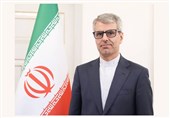Secret behind Deadlock in Nuclear Talks in Muscat, Vienna
TEHRAN (Tasnim) - Informed sources announced that the US requests from Iran regarding its missile capabilities hindered the nuclear talks which were held in the Muscat and Vienna.
The US Secretary of State John Kerry limited the agenda of talks in Muscat to Iran’s missile capabilities and refrained from discussing the nuclear issue and the US-led sanctions imposed on the country, al-Waqt news website quoted informed sources as saying.
John Kerry asked the Iranian foreign minister Mohammad Javad Zarif to raise the issue of Iran’s missile capabilities during the talks but the Iranian foreign minister rejected his American counterpart’s request and said the negotiations were supposed to deal with the nuclear issue and the sanctions imposed on Iran, said the report.
During the talks, Zarif reportedly reiterated Iran’s commitment to the interim nuclear deal between Iran and the five permanent members of the UN Security council plus Germany which was signed in the Swiss city of Geneva back in November 2013.
Also, in the latest round of the nuclear talks held in the Austrian capital of Vienna, the US secretary of state once again raised the issue of Iran’s missile capabilities and asked Iran to give the US detailed information on its new missiles as well as their ranges and also allow the American military experts to participate in the military drills which are held inside the country, informed sources noted.
Earlier this week, top diplomats from Iran and the Group 5+1 (Russia, China, the US, Britain, France and Germany) decided to extend talks on Tehran’s peaceful nuclear program for more seven months.
A fresh round of talks between Iran and the Group 5+1 (Russia, China, the US, Britain, France and Germany) were held ahead of the self-imposed deadline of November 24.
On November 24, 2013, Iran and the G5+1 (alternatively known as the P5+1 or E3+3) signed an interim nuclear deal in the Swiss city of Geneva.
The Geneva deal (the Joint Plan of Action) came into effect in January and expired in July, when the parties decided to extend negotiations until November 24 in the hope of clinching a final deal that would end a decade of impasse over Tehran’s peaceful nuclear energy program.





